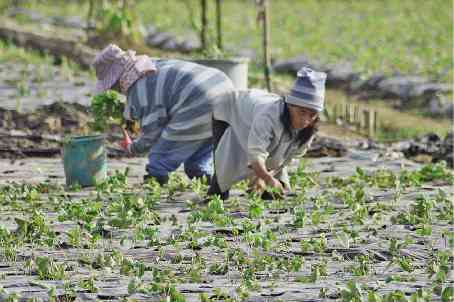
Supertyphoon “Lawin” destroyed strawberry farms in La Trinidad, Benguet province, but other farms in neighboring towns have saved enough berries to keep supply from falling. —EV ESPIRITU
LA TRINIDAD, BENGUET—Supertyphoon “Lawin” (international name: Haima) barreled through Cordillera communities last week but farms that grow strawberries, flowers and salad vegetables survived the onslaught, assuring sufficient supply for All Saints’ Day and the yuletide season.
A state of calamity has been declared in nearly all Cordillera provinces due to losses estimated to have reached P394 million in crops and P1.2 billion in infrastructure. Fifteen people were killed.
Most towns in Benguet province are putting together their strawberry supplies to meet demand after strawberry fields, which had also become tourist attractions, were flooded.
Strawberries grown in Sitio Pungayan, known to teleserye fans as the fictional “La Presa,” in Tuba town had been gathered to fill up orders, said Fely Ticbaen, La Trinidad municipal agriculturist.
Many gardens in the elevated towns of Benguet were able to save their strawberries, vegetables and cut flowers, she said.
“When it comes to strawberry production, the farmers do not compete with each other. There is cooperation among them to meet the demand of clients,” she said.
Ticbaen said farmers have grown strawberries in the Benguet towns of Tublay, Atok and Buguias, Sagada town in Mt. Province and Tinoc town in Ifugao province.
On Tuesday, farmers are still clearing strawberry fields here. John Dave de Leon, a farmer, said production would be delayed for a month but customers should expect supply to normalize in January.
Prices have not changed for La Trinidad strawberries. Marble strawberries are sold at P250 to P300 per kilogram and tourists intending to pick their own berries are still charged P450 per kg.
A farmer can earn P485,000 a year for every 250-square-meter farm if strawberries are sold at P150 per kg, according to the agricultural office here.
The amount of vegetables delivered to the La Trinidad trading post declined by 30 percent after Lawin, said Augusta Balanoy of Benguet Farmers Marketing Cooperative.
“Farmers are harvesting what they could so they could prepare and replant in time for the peak demand in December,” Balanoy said.
She said as much as 20 percent of maturing vegetables were damaged by Lawin. “The supply decreased but it will not be zero,” she added.
According to her, farmers need seeds to replant quickly and plastic sheets for their greenhouses. —DESIREE CALUZA, KIMBERLIE QUITASOL AND VILLAMOR VISAYA JR.